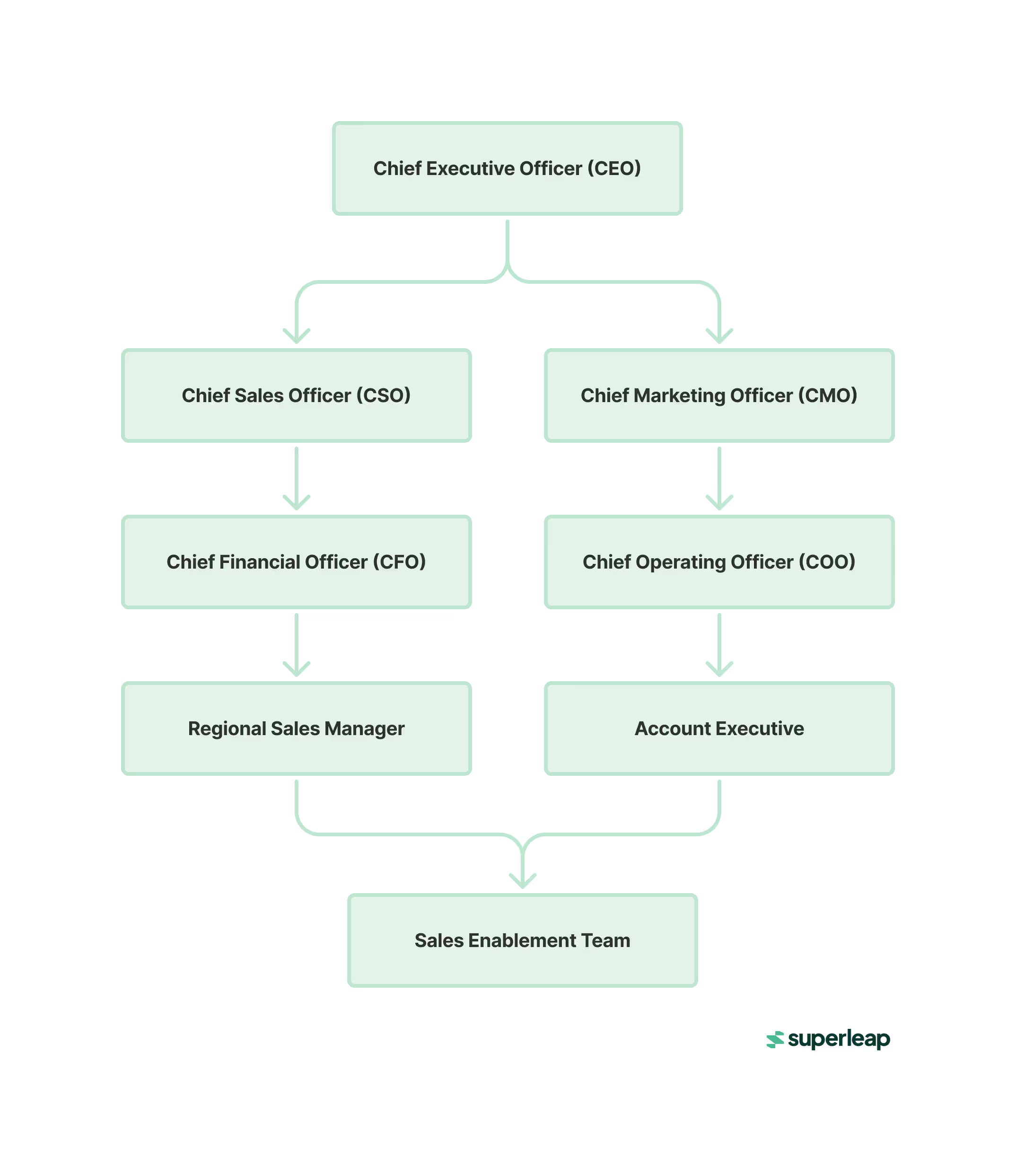

Do you want to take your company $10M to $100M? And do you think you can do that just by scaling your sales team, pushing harder and believing that great products sell themselves? The truth is, no. Even with a great sales team, you need a system that is focused on long-term growth, and the best person to bring this vision to reality is a Chief Sales Officer.
They’re the ones setting the strategy, keeping the team motivated, and making sure the company stays ahead of market shifts. If deals are stalling, they figure out why. If revenue isn’t growing fast enough, they adjust the game plan. They work closely with the head of marketing and sales, product, and customer success to make sure everything is aligned.
The bottom line is, if a company is serious about scaling up, hiring a CSO is their best bet and this blog will tell you exactly why. With each scroll, we’re sure to convince you why a CSO will take your company sales to the next level.
Who is a Chief Sales Officer?
As a senior leader with almost 10+ years of experience, the CSO also oversees sales operations, ensures alignment between sales and business goals, and fosters strong customer relationships. Their primary focus is optimizing sales performance, forecasting revenue, and ensuring the company’s competitive edge in the market.
🧬 Reporting structure

For Businesses: Do You Need a CSO?
What impact does a CSO bring?
Many companies operate without a CSO, relying on a VP of Sales or regional sales directors. However, as businesses scale, particularly in B2B, SaaS and enterprise markets, the need for a dedicated CSO becomes crucial. Here’s why:
📈 Strategic growth
A CSO takes the long-term, strategic view of sales growth. They are not solely concerned with hitting the next numbers but try to build a sustainable sales pipeline for the future. This involves gathering data and analyzing it, based on which, sales strategies are developed, and targets are set.
The market keeps changing and revenue opportunities might knock unexpectedly, therefore, a CSO is always vigilant. With other companies constantly working to stay on top of the industry, CSO’s develop a clever pricing strategy to secure your business in the race.
💰 Accountability for revenue generated
The CSO is responsible for worldwide revenue growth and diversification, whereas regional sales directors or even a VP of sales may be in charge of particular product lines or geographical regions.
It is essential that businesses that operate in several markets or have a wide range of products, adopt this holistic approach.
CSOs ensure that the strategies set are applicable on a global level with a few tweaks to emerge locally relevant.
🌐 Oversee market expansion
High-growth companies and those targeting enterprise clients face inherently complex sales environments. These often involve longer sales cycles, multiple decision-makers, intricate procurement processes, and the need for highly customized solutions.
A CSO brings the executive-level experience and strategic thinking required to navigate these complexities effectively.
🌟 Sales and marketing alignment
A CSO will work closely with the head of sales and marketing to ensure all campaigns, social media and content efforts are driven toward pushing high quality leads down the sales funnel, for the sales reps to take charge of closing.
🤝 Sales and product collaboration
The CSO partners with product teams to ensure the company’s offerings are constantly evolving to satisfy customer needs and market demands.
Key collaborative efforts include:
- Customer feedback: Sales teams relay insights gathered directly from customers to the product team, helping to refine existing products or develop new ones.
- Feature prioritization: The CSO ensures that sales feedback influences product roadmaps, prioritizing features that can drive customer acquisition and retention.
- Market trends: The CSO works with product teams to analyze emerging trends and competitors, enabling proactive adjustments to the product portfolio.
- Enablement resources: Collaborating with product teams to create sales enablement materials, such as product demos, feature sheets, and technical guides, to support sales reps in closing deals.
Chief Sales Officer vs VP of Sales
Here’s a table that distinguishes the Chief Sales Officer (CSO) from the Vice President of Sales (VP of Sales) in terms of roles, responsibilities, and scope:
Want to become a CSO? Start building these skills. Shifting focus from a business to a professional POV, here’s everything you should know as aspiring CSOs.
For Professionals: How to Grow into the CSO Role
What are the roles and responsibilities of a CSO?
1. Strategic planning
- Develop and implement sales strategies aligned with organizational goals.
- Analyze market trends, revenue forecasts, and data-driven insights to identify growth opportunities.
- Drive organizational change by aligning sales strategies with business objectives.
- Collaborate with executives to define and execute the company’s go-to-market strategy.
2. Team leadership
- Lead, mentor, and manage sales teams, fostering a high-performance culture.
- Build and nurture cross-functional collaboration with marketing, product, and finance teams.
- Drive talent acquisition, succession planning, and skills development within the sales organization.
- Inspire teams to achieve and exceed revenue targets through clear communication and motivation.
3. Customer & revenue focus
- Manage key accounts, negotiate high-value deals, and build long-term partnerships.
- Optimize sales processes and improve customer acquisition and retention strategies.
- Maintain strong client relationships to enhance customer satisfaction and loyalty.
- Develop and execute pricing strategies to maximize profitability.
- Represent the company externally, building networks and establishing strategic industry relationships.
4. Technology & data use
- Leverage CRM tools and sales automation platforms to streamline operations and improve efficiency.
- Adopt AI-driven sales strategies and predictive analytics to refine decision-making.
- Monitor and utilize digital sales strategies, including online channels and data insights.
- Ensure data integrity and real-time reporting for accurate forecasting and performance tracking.
What skills should a Chief Sales Officer possess?
- Strategic & analytical skills
- Leadership & team management
- Sales & business development
- Communication & interpersonal skills
- Financial & operational acumen
- Digital & technological proficiency
- Revenue Operations (RevOps) alignment
- Talent acquisition and development
- Forecasting and predictability
- Go-to-market strategy expertise
- Competitive intelligence and market awareness
How much do Chief Sales Officers earn?
Note: These values may vary depending on skill, experience, location, organization, and market demand.
What are the challenges faced by a Chief Sales Officer?
🔁 Handling long sales cycles
One of the biggest challenges for a CSO is handling long cycles, especially in enterprise sales, which can range anywhere from 6 to 24 months. With multiple stakeholders involved - about 6-10 key decision makers, the sales process becomes even more complex.
According to Harvard Business Review, almost 40% to 60% of the deals are lost due to customer indecision, wasting valuable time of sellers.
Solution: CSOs must implement account based marketing, use predictive analytics, streamline the internal process, tighten lead qualification methods, and most importantly, demonstrate product/service value at all times backed by data, testimonials and reviews to keep the prospects engaged.
📣 Hiring and retention
Sales is all about turnover and quick thinking. It is difficult to find talent that thrives in a fast-paced environment and performs exceptionally well.
To top that, hiring for specialized roles such as enterprise sales or B2B SaaS sales - requires identifying candidates with industry expertise, which further narrows the talent pool. Retention is equally challenging.
The burnout rate in sales departments is shooting through the roof due to constant pressure of meeting quotas coupled with a toxic environment.
Solution: CSOs need to train the sales team well, smartly distribute resources, and offer competitive compensation and create a clear career progression path to maintain a high-performing team.

📉 Aligning sales goals with changing market conditions
The quote “change is the only constant” is apt here. The market is volatile and buying behavior keeps changing, making it difficult to align sales goals with long-term business objectives.
Solution: To tackle this, CSOs must implement real-time data analytics to monitor market trends and make quick decisions to respond to changing conditions. It is also important that they communicate with the product team to ensure all offerings are customized to meet customer demands at all times.

⚖️ Balancing Customer Acquisition Costs (CAC) with revenue growth
Striking a balance between CAC and revenue growth to maintain sustainable profit is critical. According to the Corporate Finance Institute, the recovery period for CAC is typically within 12 months. If you are a high-performing company, your timeline is reduced to 5-7 months.
Solution: CSOs need to streamline sales workflows through automation and training to reduce time and resources spent per acquisition. You can also focus on customer retention by implementing post-sales strategies that enhance the customer loyalty thereby offsetting acquisition costs.
Conclusion
Ready to Step into a CSO Role? Or Hiring a CSO for your company? Test your expertise with these 7 must-know interview questions:
👉 Think you have what it takes? Prepare now and get ahead in your CSO career!
Heading text
Nunc sed faucibus bibendum feugiat sed interdum. Ipsum egestas condimentum mi massa. In tincidunt pharetra consectetur sed duis facilisis metus. Etiam egestas in nec sed et. Quis lobortis at sit dictum eget nibh tortor commodo cursus.
Odio felis sagittis, morbi feugiat tortor vitae feugiat fusce aliquet. Nam elementum urna nisi aliquet erat dolor enim. Ornare id morbi eget ipsum. Aliquam senectus neque ut id eget consectetur dictum. Donec posuere pharetra odio consequat scelerisque et, nunc tortor.
Nulla adipiscing erat a erat. Condimentum lorem posuere gravida enim posuere cursus diam.
.svg)






